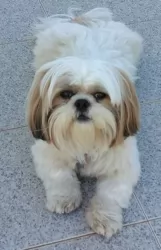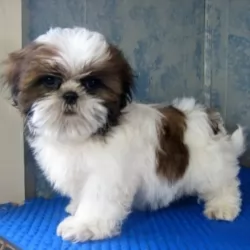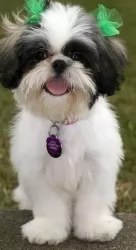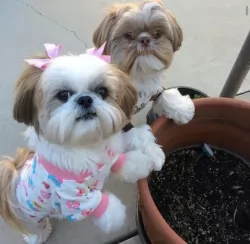 Havapoo is originated from United States but Shih Tzu is originated from China. Havapoo may grow 10 cm / 4 inches higher than Shih Tzu. Both Havapoo and Shih Tzu are having almost same weight. Havapoo may live 4 years less than Shih Tzu. Both Havapoo and Shih Tzu has almost same litter size. Havapoo requires Moderate maintenance. But Shih Tzu requires High maintenance
Havapoo is originated from United States but Shih Tzu is originated from China. Havapoo may grow 10 cm / 4 inches higher than Shih Tzu. Both Havapoo and Shih Tzu are having almost same weight. Havapoo may live 4 years less than Shih Tzu. Both Havapoo and Shih Tzu has almost same litter size. Havapoo requires Moderate maintenance. But Shih Tzu requires High maintenance
History
The Havapoo is usually a cross with a miniature Poodle and a Havanese but other poodle sizes such as the toy can be used. This is a fairly new cross breed just getting the attention of the American public. The result is a friendly, small dog. They have a striking appearance and lovable personality. They are easy to train and very smart. Not much is know about their heritage except that they were developed in the United States sometime in the past 30 years. Given the long history of the parental breeds, you can count on the quality and beauty of the Havapoo.
 The Shih Tzu is an Imperial Chinese breed developed by palace breeders hundreds of years ago with breed stock from the Tibetan lines. It is quite probable that the Shih Tzu was originally a cross between two Sino-Tibetan ancient dogs – the Pekingese and the Lhasa Apso. Based on their looks, the Shih Tzu means the lion dog, but they were really very pampered palace dogs living with the Chinese emperors and families. The emperors were always gifting the breeders who developed the most affectionate, gentle and beautiful Shih Tzus.
The Shih Tzu is an Imperial Chinese breed developed by palace breeders hundreds of years ago with breed stock from the Tibetan lines. It is quite probable that the Shih Tzu was originally a cross between two Sino-Tibetan ancient dogs – the Pekingese and the Lhasa Apso. Based on their looks, the Shih Tzu means the lion dog, but they were really very pampered palace dogs living with the Chinese emperors and families. The emperors were always gifting the breeders who developed the most affectionate, gentle and beautiful Shih Tzus.
Until the 1930’s the Shih Tzu was not known to the world outside the emperor’s palace. Once the breed did come out from behind the palace walls, they were immediately popular. Much debate went on about how to refine the breed as clubs began to spring up in Peking and then in England. It was not until 1969 the Shih Tzu was recognized and entered in the AKC Stud Book.
While the original Shih Tzu might have been a mix between the Pekingese and the Lhasa Apso, today’s breed spread around the world after the second world war. In Europe in the 1930’s the breed was classified as Apsos. In 1935 the first Shih Tzu Club of Europe was formed, and the first standard was written, and the breed was categorized as the Shih Tzu.
Following World War II, soldiers brought the dogs to the States from Europe. By the 1950’s the breed was growing in popularity and the AKC recognized the breed in 1969 as members of the Toy Group. They are now recognized by all major kennel clubs throughout the western world. They are recognized by the Federation Cynoloqique Internationale in the Companion and Toy Group, among Tibetan breeds.
The Shih Tzu is a good watchdog, but it was bred to be a companion animal. It is a friendly, open breed that welcomes strangers. They are great with other animals and children as well as adults.
Basic Information
Origin:
United States
China
Life Span:
10 - 14 Years
10 - 18 Years
Other Names:
Poovanese, Island Mini Doodle, Havadoodle, Havanesepoo, Havanesedoodle
Chinese Lion Dog Chrysanthemum Dog,, Lion Dog
Colors Available:
brown, grey, tan, white, black
all often multiple colored
Coat:
soft, hypoallergenic fur
fine, straight, and silky
Shedding:
Moderate
Moderate
Temperament:
Affectionate, Energetic, Friendly, Gentle, Intelligent, Loving, Outgoing, Playful
Affectionate, Alert, Friendly, Intelligent, Lively, Loving, Loyal, Outgoing, Playful, Stubborn
Grooming:
Moderate maintenance
High maintenance
Trainability:
Easy
Moderate
New Owners Friendly:
Yes
Yes
Description
The look of the Havapoo is unpredictable in first generation mixes as the puppies can appear like either of the parents. Most however have carried on the facial features of the Havanese. They usually have soft coats with hypoallergenic fur that comes in brown, black, grey, white and tan.
The white dogs tend to be deaf or perhaps even blind.
They are really good looking dogs whichever parent they favor.
 This is a breed of lively, sturdy and alert little dogs with a beautiful double coat that is flowing and long. In its full glory the Shih Tzu coat is touching the floor all the way around the dog. The dog’s bearing is as royal as its history, arrogantly carrying his head high and his tail curving over his back.
This is a breed of lively, sturdy and alert little dogs with a beautiful double coat that is flowing and long. In its full glory the Shih Tzu coat is touching the floor all the way around the dog. The dog’s bearing is as royal as its history, arrogantly carrying his head high and his tail curving over his back.
The Shih Tzu is a solid, compact breed with weight and substance. They may be a small dog, but they are a strong one. They have large dark eyes with a short muzzle and fur covered drop ears. They are just a little longer than they are tall with a distinct underbite.
There are a few differences between the European or UK Kennel Club standard and the American Kennel Club AKC standard. As opposed to the UK standard the AKC standard states that:
- The head is round and large, and the face looks up or forward.
• The hindquarters are muscular while the front are straight. They are balanced in that they are not too long or too short.
- The eyes face the front and are very large.
- The bod and neck are proportional and not exaggerated.
- The shoulders are frontal.
Characteristics
1Children friendliness yes but monitor their interaction so the dog does not get hurt.
2.Special talents highly intelligent and love to run
3.Adaptability Home or apartment is fine but would love a fenced yard to run in.
4.Learning ability very high smart and loves to learn
1.Children friendliness – they are very good with children.
 2.Special talents – they were bred to be companion animals. They are friendly and loyal.
2.Special talents – they were bred to be companion animals. They are friendly and loyal.
3.Adaptability Yes very much so. They can live in an apartment or on a farm. It doesn’t matter and they don’t need a yard.
4.Learning ability – intelligent but can be stubborn.
Health Problems
Even though first generation mixes have no genetic health issues. There are however some issues they are prone to:
• Deafness - primarily in the white dogs, nothing can be done for it.
• Cataracts – can lead to blindness
• Hypothyroidism – can be medicated
• Hip Dysplasia – can lead to lameness
• Patellar Luxation – can lead to lameness
 For many breeds that have the advantage of isolation like the Shih Tzu did with the emperors of China usually have very little genetic health issues. Most of the breed is indeed healthy but there are some issues.
For many breeds that have the advantage of isolation like the Shih Tzu did with the emperors of China usually have very little genetic health issues. Most of the breed is indeed healthy but there are some issues.
• Brachycephalic airway obstructive syndrome due to the shape of their face and head causes them to have breathing issues. They cannot handle heat and they cannot swim. They can have an upper airway obstruction that makes it hard for them to breath. If this is bad enough, surgery may be required.
- Hip Dysplasia and patellar luxation can both lead to lameness or arthritis.
• Hypothyroidism – thyroid does not produce the hormones necessary for metabolism to work effectively. This can lead to weight gain, hair loss, lethargy and muscle loss. It can be treated effectively.
• Issues of the eyes include – cataracts, corneal dryness and inflammation, progressive retinal atrophy, improperly closing eyelids and retinal detachment.
- Portosystemic shunt of the liver.
- Intervertebral disk disease – severe back pain.
- Epilepsy.
- Ear infections.
- Immune mediated hemolytic anemia can be fatal.
Caring The Pet
1Feeding the puppy – feed a high quality puppy food for small or toy dogs. Feed 3-4 times a day a total or 1 cup.
2.Feeding the adult - feed a high quality puppy food for small or toy dogs. Feed 3-4 times a day a total of 2 cups
3.Points for Good Health – overall good health
4. Games and Exercises – needs some moderate exercise and would love a fenced yard to run in. Will play fetch and some are good at agility.
 1.Feeding the puppy – this is a toy dog so don’t overfeed. They have a tendency to become obese. Calorie and weight level need to be calculated with any diet you feed. The diet should be high quality with plenty of protein made for toy dogs. Feed the puppy at least 3 times a day, maybe four in very small amounts, never more than ½ cup per day.
1.Feeding the puppy – this is a toy dog so don’t overfeed. They have a tendency to become obese. Calorie and weight level need to be calculated with any diet you feed. The diet should be high quality with plenty of protein made for toy dogs. Feed the puppy at least 3 times a day, maybe four in very small amounts, never more than ½ cup per day.
2.Feeding the adult - this is a toy dog so don’t overfeed. They have a tendency to become obese. Calorie and weight level need to be calculated with any diet you feed. The diet should be high quality with plenty of protein made for toy dogs. Feed the adult once or twice a day in larger amounts than the puppy but never more than ¾ of a cup per day.
3.Points for Good Health - most Shih Tzu’s are hardy with exceptionally good health.
4. Games and Exercises
This is a pampered, not high energy dog. However, she still needs playtime, which can be indoors and short walks outdoors every day.
Comparison with other breeds
- Shih Tzu vs Yorkshire Terrier - Breed Comparison
- Shih Tzu vs Chihuahua - Breed Comparison
- Shih Tzu vs Morkie - Breed Comparison
- Shih Tzu vs Havanese - Breed Comparison
- Shih Tzu vs Chorkie - Breed Comparison
- Shih Tzu vs Pekingese - Breed Comparison
- Shih Tzu vs Chinese Crested Dog - Breed Comparison
- Shih Tzu vs Chiweenie - Breed Comparison
- Shih Tzu vs Chug - Breed Comparison
- Shih Tzu vs Affenpinscher - Breed Comparison
- Shih Tzu vs Brussels Griffon - Breed Comparison
- Shih Tzu vs Chipoo - Breed Comparison
- Shih Tzu vs Chiapom - Breed Comparison
- Shih Tzu vs English Toy Terrier (Black & Tan) - Breed Comparison
- Shih Tzu vs Long Haired Chihuahua - Breed Comparison
- Shih Tzu vs Bichon Bolognese - Breed Comparison
- Shih Tzu vs Russian Toy Terrier - Breed Comparison
- Shih Tzu vs Franzuskaya Bolonka - Breed Comparison
- Shih Tzu vs Phalene - Breed Comparison
- Shih Tzu vs Bugg - Breed Comparison
- Shih Tzu vs Cockachon - Breed Comparison
- Silky Terrier vs Shih Tzu - Breed Comparison
- Snorkie vs Shih Tzu - Breed Comparison
- Toy Bulldog vs Shih Tzu - Breed Comparison
- Toy Mi-Ki vs Shih Tzu - Breed Comparison
- vs Yorkshire Terrier - Breed Comparison
- vs Chihuahua - Breed Comparison
- vs Morkie - Breed Comparison
- vs Havanese - Breed Comparison
- vs Chorkie - Breed Comparison
- vs Pekingese - Breed Comparison
- vs Chinese Crested Dog - Breed Comparison
- vs Chiweenie - Breed Comparison
- vs Chug - Breed Comparison
- vs Affenpinscher - Breed Comparison
- vs Brussels Griffon - Breed Comparison
- vs Chipoo - Breed Comparison
- vs Chiapom - Breed Comparison
- vs English Toy Terrier (Black & Tan) - Breed Comparison
- vs Long Haired Chihuahua - Breed Comparison
- vs Bichon Bolognese - Breed Comparison
- vs Russian Toy Terrier - Breed Comparison
- vs Franzuskaya Bolonka - Breed Comparison
- vs Phalene - Breed Comparison
- vs Bugg - Breed Comparison
- vs Cockachon - Breed Comparison
- vs Shih Tzu - Breed Comparison
- vs Silky Terrier - Breed Comparison
- vs Snorkie - Breed Comparison
- vs Toy Bulldog - Breed Comparison
 MyDogBreeds
MyDogBreeds Havapoo is originated from United States but Shih Tzu is originated from China. Havapoo may grow 10 cm / 4 inches higher than Shih Tzu. Both Havapoo and Shih Tzu are having almost same weight. Havapoo may live 4 years less than Shih Tzu. Both Havapoo and Shih Tzu has almost same litter size. Havapoo requires Moderate maintenance. But Shih Tzu requires High maintenance
Havapoo is originated from United States but Shih Tzu is originated from China. Havapoo may grow 10 cm / 4 inches higher than Shih Tzu. Both Havapoo and Shih Tzu are having almost same weight. Havapoo may live 4 years less than Shih Tzu. Both Havapoo and Shih Tzu has almost same litter size. Havapoo requires Moderate maintenance. But Shih Tzu requires High maintenance The Shih Tzu is an Imperial Chinese breed developed by palace breeders hundreds of years ago with breed stock from the Tibetan lines. It is quite probable that the Shih Tzu was originally a cross between two Sino-Tibetan ancient dogs – the Pekingese and the Lhasa Apso. Based on their looks, the Shih Tzu means the lion dog, but they were really very pampered palace dogs living with the Chinese emperors and families. The emperors were always gifting the breeders who developed the most affectionate, gentle and beautiful Shih Tzus.
The Shih Tzu is an Imperial Chinese breed developed by palace breeders hundreds of years ago with breed stock from the Tibetan lines. It is quite probable that the Shih Tzu was originally a cross between two Sino-Tibetan ancient dogs – the Pekingese and the Lhasa Apso. Based on their looks, the Shih Tzu means the lion dog, but they were really very pampered palace dogs living with the Chinese emperors and families. The emperors were always gifting the breeders who developed the most affectionate, gentle and beautiful Shih Tzus. This is a breed of lively, sturdy and alert little dogs with a beautiful double coat that is flowing and long. In its full glory the Shih Tzu coat is touching the floor all the way around the dog. The dog’s bearing is as royal as its history, arrogantly carrying his head high and his tail curving over his back.
This is a breed of lively, sturdy and alert little dogs with a beautiful double coat that is flowing and long. In its full glory the Shih Tzu coat is touching the floor all the way around the dog. The dog’s bearing is as royal as its history, arrogantly carrying his head high and his tail curving over his back. 2.Special talents – they were bred to be companion animals. They are friendly and loyal.
2.Special talents – they were bred to be companion animals. They are friendly and loyal. For many breeds that have the advantage of isolation like the Shih Tzu did with the emperors of China usually have very little genetic health issues. Most of the breed is indeed healthy but there are some issues.
For many breeds that have the advantage of isolation like the Shih Tzu did with the emperors of China usually have very little genetic health issues. Most of the breed is indeed healthy but there are some issues. 1.Feeding the puppy – this is a toy dog so don’t overfeed. They have a tendency to become obese. Calorie and weight level need to be calculated with any diet you feed. The diet should be high quality with plenty of protein made for toy dogs. Feed the puppy at least 3 times a day, maybe four in very small amounts, never more than ½ cup per day.
1.Feeding the puppy – this is a toy dog so don’t overfeed. They have a tendency to become obese. Calorie and weight level need to be calculated with any diet you feed. The diet should be high quality with plenty of protein made for toy dogs. Feed the puppy at least 3 times a day, maybe four in very small amounts, never more than ½ cup per day.